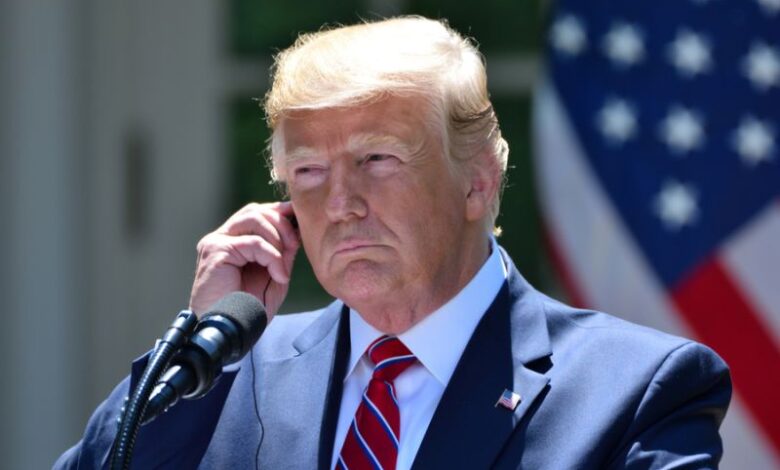Trump romps in Iowa, a traditional stronghold for social conservatives

 President Donald Trump. / Evan El-Amin/Shutterstock
President Donald Trump. / Evan El-Amin/Shutterstock Washington, D.C. Newsroom, Jan 15, 2024 / 22:00 pm (CNA).
The results of the first-in-the-nation Iowa caucuses are powering a strong start to former President Donald Trump’s 2024 bid to return to the White House.
As of just after 10 p.m on Monday Trump was winning 53 percent support from Republican caucus-goers in the Hawkeye State. Florida Gov. Ron DeSantis trailed in a distant second place with 20 percent, while former U.S. Ambassador to the United Nations Nikki Haley lagged behind in third place at about 18 percent. Political novice and entrepreneur Vivek Ramaswamy was at the back of the pack, with about seven percent.
The Associated Press had already called the race for Trump before 9 p.m.
Trump’s victory represents a sharp break with previous voting patterns by Iowa Republican caucus-goers, who since 2008 have traditionally favored the most socially conservative, pro-life candidate.
In 2016, Trump received only 24% of the vote in a close contest that was won by Texas Sen. Ted Cruz, who prevailed with more than 27% of the vote.
In 2012, the contest was won by former Sen. Rick Santorum, while in 2008 former Arkansas Gov. Mike Huckabee led the field.
Citing a CBS poll, Kelsey Pritchard, the director of state public affairs at Susan B. Anthony Pro-Life America, told CNA that nearly three-fourths of Iowa’s Republican voters believe that an unborn child’s life in the womb should be protected in all or nearly all cases. Lawmakers in the state approved a heartbeat bill, but the legislation has been blocked by the courts.
“Our next president needs to stand for national protection [of the unborn] so babies are protected in states like Iowa,” Pritchard added.
When speaking about abortion in a Fox News town hall last week, Trump said he is “proud” to have gotten Roe v. Wade overturned and warned that “you have to win elections, otherwise you’re going to be back to where you were.”
While not getting specific, the former president said on abortion policy: “We’re going to get something that people want, that people like” and “I think you’re going to be happy in the end” when asked a question by a pro-life voter.
Trump nominated three of the six judges who voted to overturn Roe v. Wade in 2022, which allows states to once again fully regulate abortion.
Yet, following an underwhelming performance from Republican candidates in the 2022 midterm elections, Trump publicly feuded with some pro-life groups and blamed aggressive pro-life Republican efforts for the losses. The former president has remained open to some federal abortion restrictions but has not committed to a 15-week ban on abortions and criticized DeSantis for signing a six-week ban in Florida.
“It’s obviously not costing him too much and he’s thinking there’s a good upside when he has to run in the general campaign,” Joshua Mercer, who edits The Loop, the daily newsletter for the political advocacy group CatholicVote, told CNA.
Mercer said “Trump was much too critical of pro-lifers” but said that Trump probably thinks that advocating for a federalist approach to abortion will “make it easier for him to campaign on [it] in the general election.”
In an interview with CNA, Mercedes Schlapp, a Catholic who served in the Trump administration, noted that “Roe v. Wade would have never been overturned” without Trump’s Supreme Court appointments.
She emphasized that “he listens to the pro-life community” and was the first sitting president to speak at the March for Life. “Trump delivered on the issue by basically providing strong constitutionalist judges,” Schlapp said.
Schlapp also argued that Iowans remember the economy under Trump and trust him more on national security issues and the border: “Basically things were just better with Trump.”
The lackluster performances by the two candidates racing neck-and-neck for second place, DeSantis and Haley, especially spells trouble for DeSantis, according to Mercer, because he put “so much time and energy” into the contest and “it just becomes that much more steep of a climb” for the governor.
Alternatively, Mercer noted that Haley “could pull off a surprise in New Hampshire,” which has a Republican base that is “more liberal and moderate.” However, he said she could still struggle “in future states that will be much more conservative.”
Schlapp pointed out that even if Haley performs strongly in New Hampshire, she will “run into the issue of South Carolina where President Trump dominates” and would probably need to “drop out” if she loses her home state.
The next Republican contest will be the New Hampshire primary on Jan. 23. Then, the Nevada and Virgin Island caucuses will be held on Feb. 8, the South Carolina primary will be on Feb. 24, and the Michigan primary will be on Feb. 27. Idaho and Michigan caucuses will be held on March 2; the Washington, D.C., primary will be held on March 1–3, and the North Dakota caucus will be held on March 4.
There will be 16 contests on Super Tuesday, which is on March 5: Alabama, Alaska, American Samoa, Arkansas, California, Colorado, Maine, Massachusetts, Minnesota, North Carolina, Oklahoma, Tennessee, Texas, Utah, Vermont, and Virginia.




